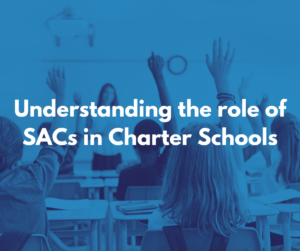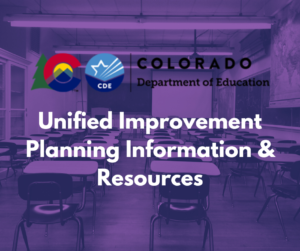
School Accountability Committees
Each public school in the state of Colorado is responsible for establishing a School Accountability Committee (SAC) and should be comprised of at least the following:
- The Principal of the school or the principal’s designee
- One teacher that provides instruction at the school
- Three parents of students actively enrolled at the school
- One adult member of an organization of parents, teachers, and students recognized by the school (PTA!)
- One person from the community
What are SACs responsible for?
- Making recommendations to the principal on the school priorities for spending school moneys, including federal funds where applicable.
- Publicizing and holding SAC meetings to discuss strategies to include in a school Priority Improvement or Turnaround, if either type of plan is required, and using this input to make recommendations to the principal and local school board concerning preparation of such plans prior to the plans being written.
- Publicizing the district’s public hearing to review a school’s written Priority Improvement or Turnaround Plan.
- Meeting at least quarterly to discuss whether school leadership, personnel, and infrastructure are advancing or impeding implementation of the school’s Performance, Improvement, Priority Improvement, or Turnaround plan, whichever is applicable, and other progress pertinent to the school’s accreditation contract.
- Providing input and recommendations to the District Accountability Committee (DAC) and district leadership, on an advisory basis, concerning principal development plans and principal evaluations. (Note: This should not in any way interfere with a district’s compliance with the statutory requirements of the Teacher Employment, Compensation, and Dismissal Act.)
- Publicizing opportunities to serve and soliciting parents and community members to serve on the SAC.
- Assisting the district in implementing the district’s family engagement policies at the school level.
- Assisting the school personnel to increases families’ engagement with teachers, including families’ engagement in creating students’ READ plans, Individual Career and Academic Plans, and plans to address habitual truancy.
Unified Improvement Plans
Unified Improvement Planning was introduced in 2009 to streamline improvement planning components of the state and federal accountability requirements. Based on the Colorado Achievement Plan for Kids (SB212-08), the primary purpose of improvement planning is to align efforts to: Ensure all students exit the K-12 education system ready for post-secondary education, and/or to be successful in the workforce, earning a living wage immediately upon graduation. In addition, the federal Elementary and Secondary Education Act (ESEA) requires that improvement planning be focused on ensuring that all students in the state reach proficiency in English language arts/reading and mathematics.
Colorado schools and districts can improve student learning and system effectiveness by engaging in a cycle of continuous improvement to manage their performance. To support this purpose, the Education Accountability Act of 2009 requires each Colorado district and school to create an annual improvement plan.
The intent is that schools and districts create a single plan that has a true meaning for stakeholders, ultimately reducing the total number of separate plans required. With that in mind, the Colorado Department of Education has developed a unified improvement planning template and processes to support schools and districts in their performance management efforts.
The UIP template has been designed to meet state, federal, and program accountability requirements.



